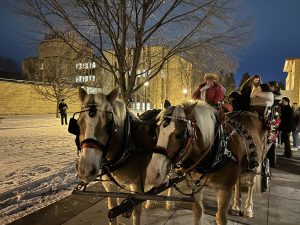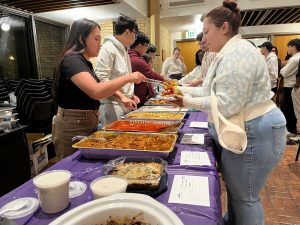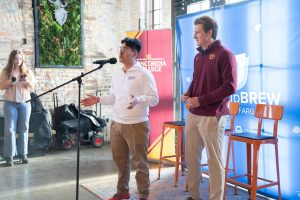A collaborative research project between the psychology and biology departments is seeking financial assistance from an atypical source: a carbonated soft drink giant.
The research team of Susan Larson, associate professor of psychology and director of undergraduate research, Krystle Strand, assistant professor of biology, and seniors Amber Ferris and Sadie Skarloken entered the Pepsi Refresh contest in early September for a chance to receive $50,000 toward their lupus research.
Pepsi Refresh is an online grant program that makes available millions of dollars to people, businesses and non-profits with ideas that will have a positive impact on their community or on the world in the categories of health, arts and culture, food and shelter, the planet, neighborhoods and education. Ten winners are chosen monthly in each award category ($5,000; $25,000; $50,000; $250,000) through an online voting process.
Larson, Strand, Ferris and Skarloken’s research focus is on the behavioral and gene expression changes associated with lupus. An incurable autoimmune disease of unknown origin, lupus causes the immune system to attack healthy tissue. In addition to causing a characteristic butterfly rash and severe kidney and lung dysfunction, over 80 percent of lupus patients experience depression, anxiety and/or memory deficits. Moreover, of the 1.5 million Americans living with lupus, 50 percent have a major organ affected, according to the Lupus Foundation of America.
The major organ Larson, Strand, Ferris and Skarloken are concentrating on is the brain. Currently, the treatments for lupus are most often steroids or immunosuppressive drugs, which come with adverse side effects like a weakened immune system, decreased bone density and weight gain. Research is evaluating alternative treatments for lupus, but very little is known about these treatments’ potential benefits for reducing or preventing the cognitive deficits associated with lupus. Larson, Strand, Ferris and Skarloken’s research aims to evaluate the effect of these new alternative treatments on the brain.
Larson and Strand began researching lupus about four years ago. Larson has had a long-term interest in understanding how immune system activation influences cognitive functioning. When Strand was hired in 2006, both Strand and Larson thought they would make great research partners since Strand’s interest in molecular neurobiology and bioinformatics complemented Larson’s pursuit.
“We’re interested in understanding the gene regulation that mediates changes in cognitive functioning associated with lupus,” Strand said.
Ferris, majoring in biology and minoring in psychology and neuroscience, started working on lupus research three years ago, and Skarloken, majoring in biology and minoring in chemistry and Spanish, joined the team this summer. Two other students, Derek Mattern, a senior, and Cindy Kyi, a junior, have joined the effort this fall. Both Ferris and Skarloken said their lupus research has provided them with several rewards.
Skarloken said the research confirmed her desire to go on to medical school, and it gave a greater significance to the things she learned in the classroom.
“It’s a chance to have fun and get hands-on experience, but you’re also learning and furthering your education in science,” Skarloken said.
Ferris agreed, and said research gives her a purpose.
“For me, it anchors my meaning for being here,” she said.
Larson and Strand have worked with several other students on this on-going research and have received funding through the Concordia undergraduate research budget, a Concordia summer study grant and the Fuglestad/Torstveit research endowment.
Strand’s neighbor in the Jones Science Center, Betty Larson, professor of nutrition and dietetics, told her about the Pepsi Refresh project. Students in one of Larson’s courses researched organizations that grant money for ideas. Strand said that the Pepsi Refresh grant added a whole new dimension to their project.
“It’s not the typical grant scientists apply for,” Strand said. “We needed to figure out how to appeal to the public to vote for what we think is important work.”
Larson said the Pepsi Refresh grant application was great from a student learning perspective because it forced them to think about how to sell their project to people who may not be familiar with molecular biology or lupus.
Ferris said she and Skarloken tried to provide information about lupus so voters can understand why the research team is doing what they do, and the big picture effect it has on the public.
Skarloken said they have been circulating the Web site link to their project, refresheverything.com/curelupus, via e-mail and Facebook to get more votes, but they need all the votes they can get to advance into the top 10 by Oct. 31, when voting for this month’s projects concludes.
“You can vote every day. Voting just once isn’t going to help us. Just get on there once for 20 seconds every day,” Skarloken said.
“Make it part of your daily routine,” Ferris added with a laugh.




Be First to Comment